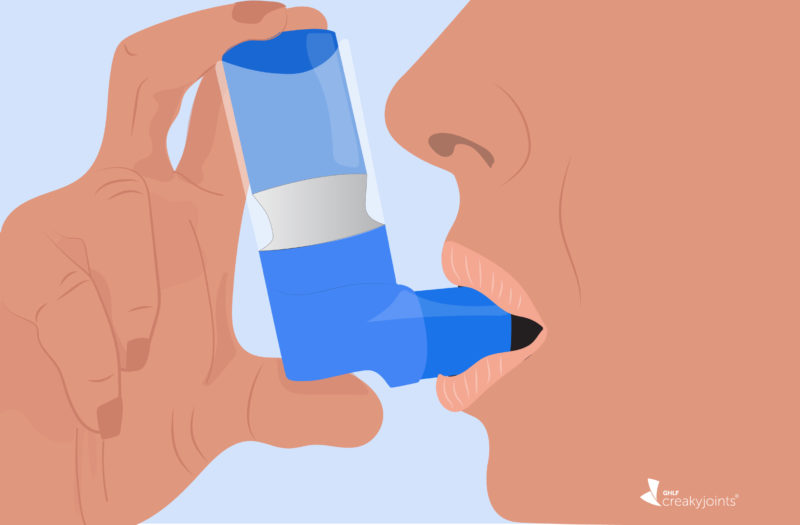Learn more about our FREE COVID-19 Patient Support Program for chronic illness patients and their loved ones.
Chances are you’ve seen your fair share of dismissive coronavirus memes or social media posts by now — those that shame people for stocking up on hand sanitizer, disinfecting wipes, or canned good or that compare coronavirus deaths to deaths from heart disease, cancer, diabetes, and other causes.
These kinds of posts can be extremely troubling to people with chronic illness — or “underlying health conditions,” as media coverage commonly describes it — who have a very real increased risk of serious complications from respiratory infections like coronavirus (or flu, or pneumonia).
Last night, CreakyJoints focused its monthly #CreakyChats on Twitter on coronavirus concerns in the chronic illness community — and, not surprisingly, it was one of the most powerful and engaging ones to date. With nearly 20 million impressions, 1,500 tweets, and 250 participants, the chat allowed patients with chronic illness, health care providers, and media outlets to have a supportive space to discuss issues and concerns that aren’t getting much attention elsewhere.
Learn more about #CreakyChats and sign up to receive notifications about future ones.
One such hot-button topic was what patients with chronic illness wish other people could understand about their coronavirus concerns — and the responses were powerful and eye-opening:
1. It’s a privilege not to have to take coronavirus risks seriously
I want to raise my hand and be counted among the ‘medically fragile’ people most at risk of dying if I contract #COVID19. So anyone not taking this seriously because they are healthy need to realize that many of us don’t have that privilege.” — @SocialMediaShan
2. Do what you can to keep those around you safer
#COVD-19 will most affect the vulnerable ppl in your lives with #heartdisease, respiratory issues, cancer, #autoimmune diseases, your grandparents. Your risk may not be as high, but washing your hands will keep your ppl safer. Wash your hands! Don’t buy masks! — @UnxpctedAdvocate
Wash your dang hands often and fully. Don’t go out if you are sick. I want them to know there are people of all ages who are more susceptible to bad consequences of getting the flu or COVID-19 so think about others. — @Dividivigirl
Don’t play around with it. If you have to err, always err on the side of caution. — @itsamuddylife
Don’t panic, think about everyone and how to protect yourself and others. — @hippychick55
3. Stop using the word ‘only’
Healthy people should take the #COVID19 situation as an opportunity to show others how much they love them. The should also consider why this society is comfortable saying “only” the elderly, chronically ill, and #disabled will suffer and die. — @dawnmgibson
That our lives matter. Some people are dismissing the threat saying it is ‘only’ deadly for the elderly, the young and those with chronic conditions. Grrrrr…. — @rosieainley
They might not be worried about themselves — and don’t take precautions — there are many others around them that could become very ill from COVID-19, or even die. It could be their grandma, a friend, or a stranger, but we’re all human and have a right to live. — @RheumaBlog_Wren
Two percent of 300 million is 6 million. That is a LOT of vulnerable people. Our lives have value too. — @VenZenix
4. Panic-buying hurts people who may need to avoid public places
Senseless panic-buying makes it harder for many sick or disabled people to get supplies when they do manage to get to the shops. — @rosieainley
5. Avoid making comparisons to other diseases
Stop posting stats of people who died from cancer and heart disease in comparison to #coronavirus. — @mrsmurphy_22
6. Know that any bad infection can be life-threatening if you are immune-compromised
With this — and similar illnesses such as flu and pneumonia! — they can, simply, kill us. It’s a kindness to everyone to demonstrate hygiene and to stay home when ill if that is possible. — @fridawrites
Take it seriously; it is not like the flu. There is not an antiviral to help [us] recover. — @owlsgryphons
7. Keep being hygiene-conscious even after this outbreak
They need to know that this new level of hygiene they’re implementing should be routine already. It’s the same level chronically ill utilize daily as a matter of survival. — @kerbicide
8. Stay home if you’re sick
You don’t need to be a “hero.” Don’t come to work/school/store sick. You may handle it “just fine” but you are impacting a whole lot of other people. — @FragrantGrace
9. Only share information from reliable sources
Please #factcheck information. Listen to doctors and scientist, not “they said” or “somebody told me.” — @RABionic
10. We need to connect with others like us for support
Despite what we hear, we are not disposable. We are coming together during a crisis to share knowledge, and to support one another. This won’t be the last virus to circulate like this and we can use this experience to better prepare for the future. — @marcilync1
Get Free Coronavirus Support for Chronic Illness Patients
Join the Global Healthy Living Foundation’s free COVID-19 Support Program for chronic illness patients and their families. We will be providing updated information, community support, and other resources tailored specifically to your health and safety. Join now.






